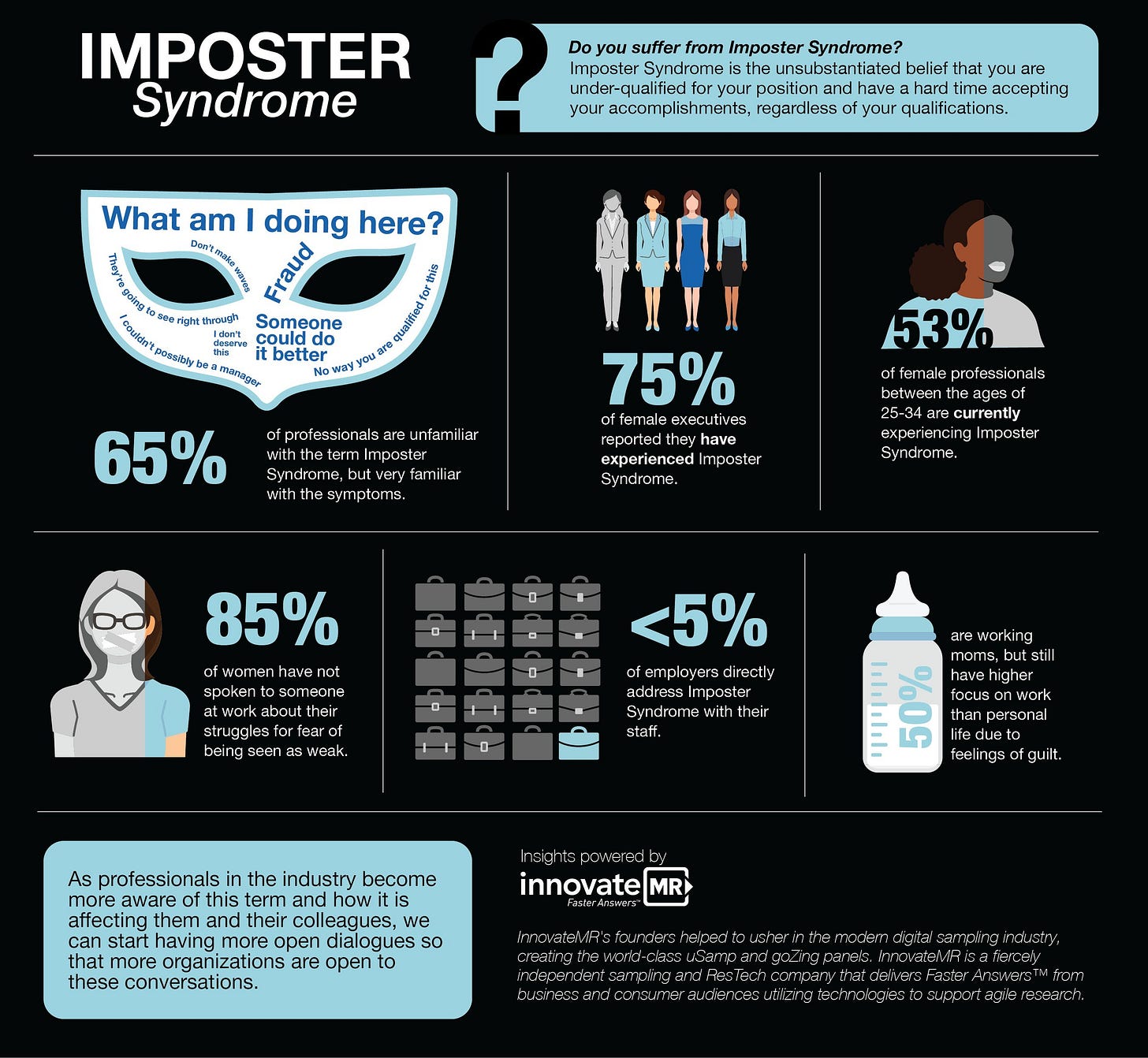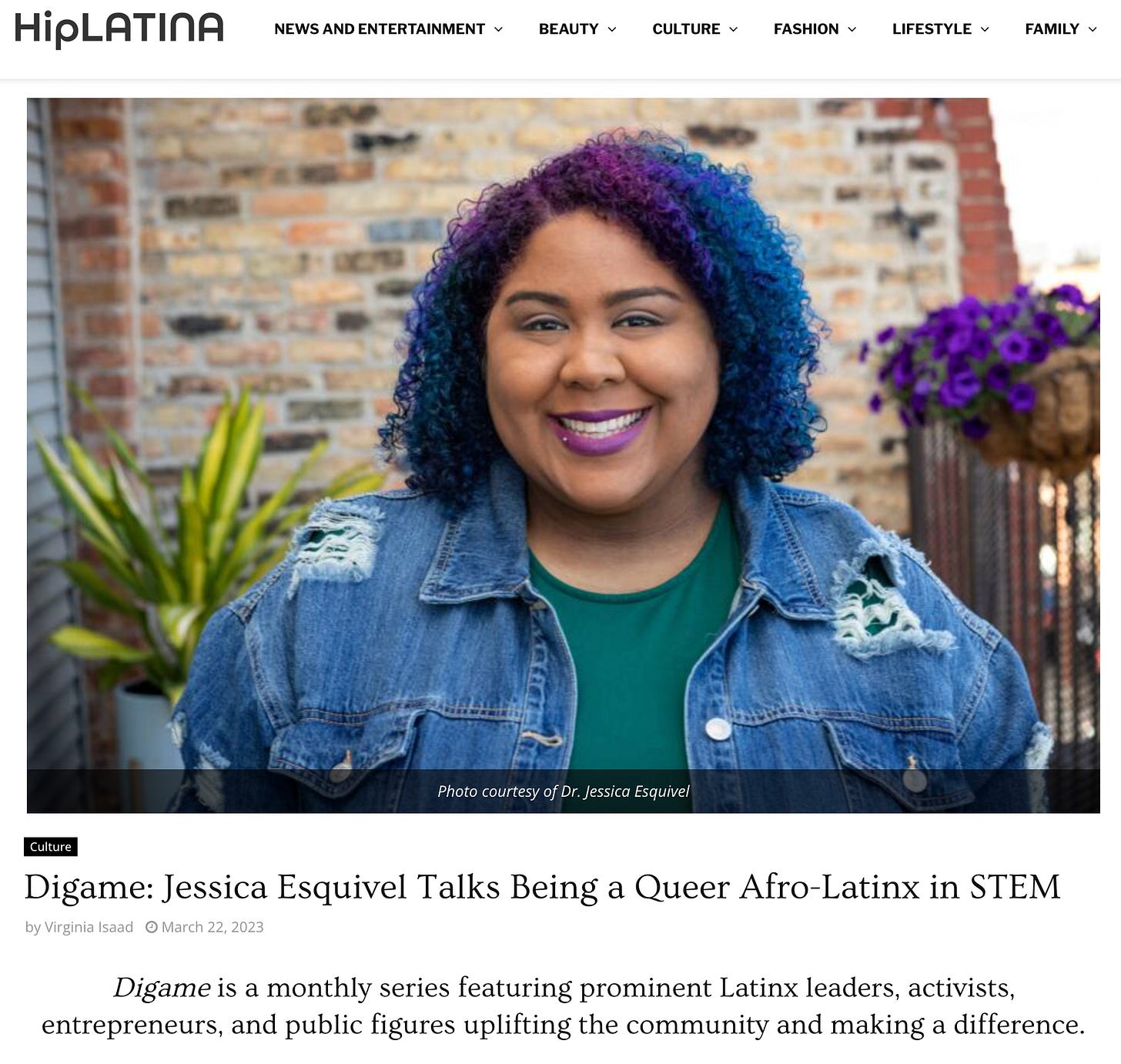Queerness predates its modern meaning.
Queerness predates its derogatory meaning.
Queerness predates colonialism
and Christianity.
Queerness predates any hate attached to it.
I call myself [B]lack.
I call myself [Q]ueer.
I call myself beautiful.
I call myself eternal.
I call myself iconic.
I call myself futuristic.
The Black Flamingo
Imposter syndrome is thrown around these days like glitter at a pride parade. But how did this term originate, and is it what we marginalized folks in STEAM are combatting? Or are our qualms to do with a more sinister Kudzu vine, deeply rooted in the academic landscape, devouring everything in its path?
If you haven’t noticed…
I’ve fallen behind the arbitrary deadlines I set for myself when creating this substack. The main reason is my internal negative Nemesis in my head telling me, “Why in the world would anyone want to read what you have to say? You’re not a writer or interesting. You’re barely even a scientist!” They’re so damn loud and naggy it’s next to impossible to tune them out. My Nemesis has been around ever since I can remember; They live off of me, like the blue-gray bulbous bloodsuckers I used to pinch off my childhood dog in the blistering Texas heat. Unfortunately, Nemesis isn’t as easy to pluck off. In graduate school, Neme came out full force. Neme got greedy and began sucking the life out of me. The gray pallor that ticks get to when engorged mimicked my skin coloring due to the over 300 cloudy days in Syracuse, NY, and the deep depression I fell into but convinced myself was a regular part of getting a Ph.D.
Funnily enough, I recently returned to my alma mater for the first time since graduating to give a seminar. This homecoming had been scheduled many months in advance. While the anticipation of returning to the gray city and connecting with my gem of an advisor was mainly appealing, there was a gnawing in the cavernous depths of my brain that I couldn’t quite figure out. It wasn’t until the day before that I made sense of the gnawing and had a full-on panic attack about returning to the scene of so much trauma that I had shoved deep: far away from my living consciousness. All in all, my return to the gray city was festive, heartwarming really. The pride my advisor had in introducing me to the department was palpable. I had to quickly compose myself before beginning the seminar because I realized how fortunate I was —and still am— to have such a fierce advocate and genuine supporter in my corner and realize how significant their presence in my life has been. This intense gratefulness for my advisor was juxtaposed with deep memory mining and emotional triggers I had long forgotten. The first night we arrived in the SYR, my wife, Em, and I rode around the city, bringing to the forefront memories of my grad school epoch. I told Em it was like I had TV static instead of memories from that era and that I was adjusting my antennae to recall. The shocking bit about that analogy is that Em had just seen it used by J K Chukwu in her novel The Unfortunates to depict the trauma the main character was experiencing during graduate school. Sit with this for a minute: our experiences as Blackacademics in higher education are so everyday and systemic that even our analogies to these traumas mirror each other. I vividly remember scrolling through #BlackInTheIvory triggered because so much of the traumas I had experienced in graduate school, which I had subconsciously normalized, was being mirrored to me repeatedly by Blackademics across the country.
Grad school is also when I learned about Imposter Syndrome, and I remember thinking, “Oh, Neme, that’s you!” But things are never as they appear, so let’s dissect the term.
Imposter Syndrome: A psychological occurrence in which people doubt their skills, talents, or accomplishments and have a persistent internalized fear of being exposed as frauds.1
Imposter Phenomenon (IP)2 was first introduced into the lexicon in 1978 by psychologists Drs. Joe Langford and Pauline Rose Clance. Their five-year analysis followed over 150 highly successful women. As stated in their research, “these women find innumerable means of negating any external evidence that contradicts their belief that they are, in reality, unintelligent.”
So, according to these psychologists, primarily white, middle to upper-class women ages 20-25 suffer from the Imposter phenomenon. So let me ask ya’ll this, have you suffered from Imposter syndrome? Answer below.
Research on Imposter Phenomenon, like our knowledge of many things around us, has evolved, and now we know somewhere between 60-80% of the workforce has or is suffering from Imposter Syndrome. 3456 The founding of the term IP was so niche in its focus, that effects from isms like racism, xenophobia, homophobia, and classism, were wholly ignored. And unlike our white counterparts, we are bombarded with messaging that we aren't capable of higher education, we are ill-prepared to compete in the Ivory Tower, and our intellect isn't at the level necessary to comprehend topics like math and fundamental science. These external messages of inadequacy, coupled with imposter syndrome, are severely detrimental to our mental and physical health. In fact, there are discussions7 about how race-based traumas could lead to a heightened internal negative dialog that is shockingly similar to the imposter phenomenon that it leads one to chicken/egg circular arguments. So rather than sweeping all occurrences of IP under the proverbial imposter syndrome rug, let’s machete our way through the Kudzu vine.
Why we should stop telling marginalized populations they have Imposter Syndrome
While so many workshops, initiatives, and thought leadership programs have interrogated how to combat imposter syndrome in those that are afflicted ad nauseam, fewer conversations have been initiated around why marginalized communities are afflicted, how our cishet patriarchal anit-Black society promotes IP, and how organizations can intrinsically develop counter-culture to combat normalized toxic academic/work environments8. Peek back at the title of this post right quick, the subheading I chose was, "it's not me, it's you", because I really want us to sit with the fact that since the inception of the term IP, the onus has been placed on the individuals afflicted. But this is a farce!
I am not the problem! And solutions to IP, like practicing self-confidence, steering clear of perfectionism, and celebrating achievements, are bandaids for a blood-gushing open wound.
I am not the problem! And these solutions are shitty ploys to blind us and occupy us from killing the kudzu vine.
I am not the problem. You are.
You, the Ivory Tower, are the problem as you continue to erect barrier after barrier to exclude access to marginalized groups.
You, The Media, are the problem as you continue to push narratives of only white cishet males doing science and continue to keep hidden the extraordinary Black excellence that have done been doing THE DAMN THANG!
You, Corporate America, are the problem as you continue to spew “we believe in diversity” while simultaneously shitting on initiatives spearheaded by marginalized stakeholders in your organizations and catapulting us off the black bluff.910
While there is so much literature describing how recognizing that 70% of the U.S. workforce suffers from imposter syndrome works to assuage the mental health effects and combat the syndrome, my recognition of IP being a pandemic brought on by YOU has been much more effective.
It’s not me, it’s you. And I encourage us all to queer our understanding of imposter syndrome and rehabilitate our solutions to the phenomenon. Introspection is critical, so do me a solid and ask yourself, “Am I in bed with the Kudzu vine?”.
Well, that’s all I gotta say for now, save for, thank you! Even as I wrestled with Neme for weeks, ya’ll kept subscribing. I ghosted ya’ll, and you still subscribed. We are now a community of 100 strong, and I’m so grateful to ya’ll for reminding me that I have something to say and that ya’ll are here for the conversation! So let’s get back to chatting regularly, shall we? Speak soon!







